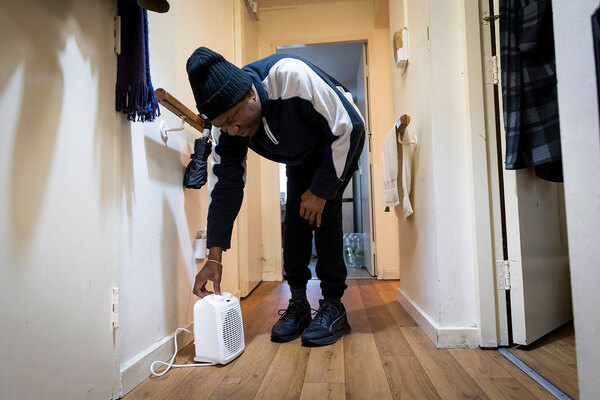You are viewing 1 of your 1 free articles
London council pays out £18,800 after three findings of severe maladministration
The Housing Ombudsman has ordered Waltham Forest Council to pay out £18,800 in compensation following three cases of severe maladministration.
The sector watchdog has made the findings in cases that included poor handling of damp and mould involving a vulnerable resident and another resident experiencing anti-social behaviour (ASB) for five years.
The London council said the learning from these instances has been used to inform its improvement work going forward after admitting its approach “did not meet our own high standards”.
In the first case, the ombudsman found severe maladministration in how the landlord handled a damp and mould repair, in particular its planning and project management in relation to works to resolve the issue.
After the resident first reported the problem, Waltham Forest Council closed the case without doing any repairs or letting the resident know.
It took 11 months for the landlord to arrange an inspection of the home and another month for any work to be planned in.
The resident and her family, which included her autistic son, asked about moving while the work was underway, but did not receive a reply. They eventually moved into a caravan due to the conditions.
The ombudsman found that the council failed to fulfil its duties set out in the Equality Act 2010 as it did not consider the resident’s disability and the vulnerabilities of her son and husband.
The quality of the work was also questioned in this case, alongside the ability to live in the property while the resident’s possessions were moved around during the repairs.
This was found to have had a ”significant detrimental emotional and physical impact” on the resident, resulting in a compensation payment of £2,737, an apology from the council, and refresher training for all staff in complaint handling.
In the second case, Waltham Forest Council left the administration of the non-succession of a resident’s tenancy for seven years, which the ombudsman described as an “unacceptable length of time”.
During this time, the landlord accepted rent payments from the resident and adjusted rent levels, but it was only during a fraud check that any action was taken.
The council also contacted the resident regarding council tax, housing benefit and a carer’s bill for his mother at the property address, offering their condolences in one instance. This meant that the local authority was aware the resident was living at the property following his mother’s death and that the death would have been noted, with council tax and housing benefit accounts adjusted accordingly.
The significant impact this had on the resident could have been avoided had the council acted in accordance with its own policies and considered the exercise of reasonable discretion after its error and delay.
The ombudsman highlighted how the landlord ignored the statutory provisions of the Coronavirus Act 2020, as it issued the notice to quit with just over a month’s notice period, despite the act stipulating at the time that a minimum of four months’ notice was required.
Waltham Forest was ordered to pay £4,750 in compensation, review how it communicates internally and to revise its “actions following death of tenants” process to prevent further serious delays.
In the last case, the ombudsman found severe maladministration in how the landlord failed to adequately deal with a resident’s reports of ASB and gang behaviour over a five-year period. It also failed to effectively respond to her subsequent request for a move.
The resident endured years of feeling unsafe in her own home, as well as being scared of what might happen to her or her young children. She suffered a significant decline in her mental well-being.
The ombudsman said this was evidenced by medical reports, and further distress was caused by having to stay away from her home, sofa-surfing and in temporary accommodation for genuine fears for her own safety.
As Waltham Forest did not take ownership of the case, or express urgency, this amounted to a failure within its partnership working, both with its own specialist teams and the police, which caused delays and culminated in an “inappropriate management move”.
The ombudsman ordered the landlord to pay £11,300 in compensation, for the chief executive to provide a written apology to the resident and for the council to review its ASB policies.
Richard Blakeway, the housing ombudsman, said: “I recognise the challenges the housing crisis and resources are presenting to landlords. However, this context cannot excuse some of the failings in these cases, which led to significant impact on residents who were, in different ways, vulnerable.
“Running throughout these cases were missed opportunities by the landlord to put things right for the resident and rebuild the relationship.
“Instead, a lack of clarity around responsibilities and actions taken, or outstanding, alongside delays or poor communication compounded the issues and resulted in considerable distress to the residents.
“Our recent Spotlight report on attitudes, respect and rights highlighted the need for landlords to adhere to their duties under the Equality Act 2010. One of these cases in particular shows the human impact of not doing so for landlords.
“I’d urge all landlords to take in those recommendations from the report and implement them to improve services and responses to residents.”
In its learning statement, Waltham Forest Council said: “We appreciate that in these three cases we did not meet our own high standards, and we apologise unreservedly to the residents who were affected.
“We fully accept the Housing Ombudsman’s findings. A significant service transformation programme has been underway for the past year. The learnings from these cases have been used to make sure we are listening to our residents’ voices and have informed the improvement to services that we have made.”
The council said its review of all three cases resulted in several improvements that included a new ASB procedure, staff training on complaints handling and a reduction in the administrative burden on grieving families.
This was introduced alongside the establishment of a damp and mould taskforce.
In October, Inside Housing revealed that staff shortages at Waltham Forest Council meant government figures suggesting fewer people presented as homeless were misleading and that people were not in fact being assessed.
Sign up for our regulation and legal newsletter
Already have an account? Click here to manage your newsletters












